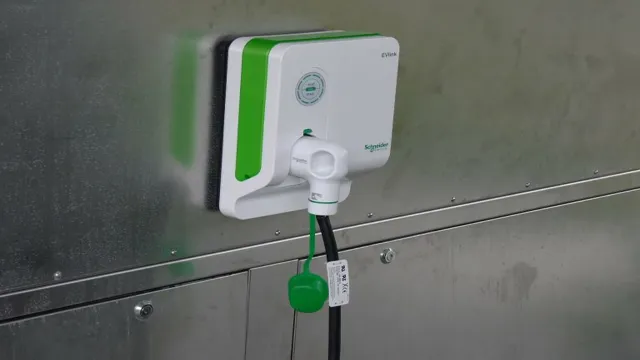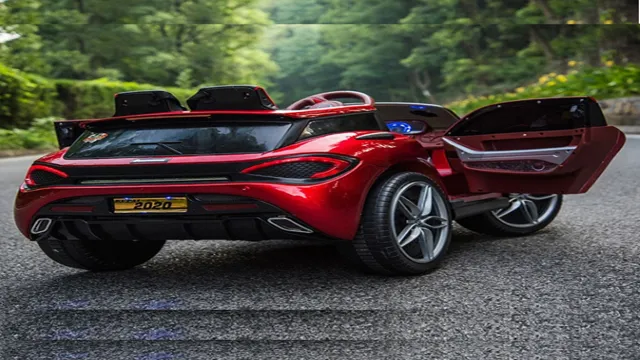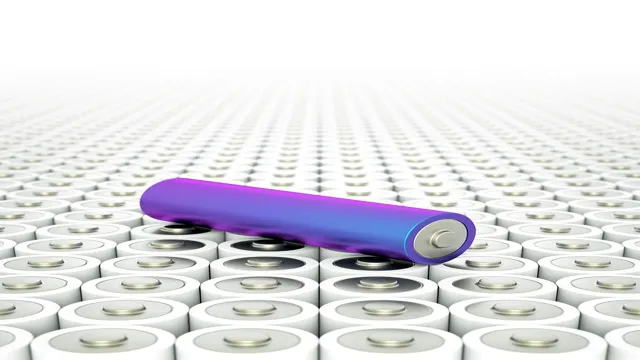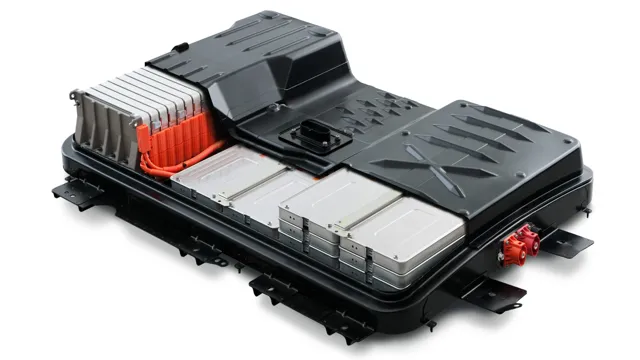Brexit Sparks a Race for Electric Car Batteries: Is the UK Ready to Lead the Charge?
If you thought that the Brexit deal only affects trade between the UK and the EU, think again. The agreement has sparked an electric car battery race that could change the automotive industry forever. With the UK no longer bound by EU regulations, it can now create its own policies and regulations for the industry, potentially setting itself apart in the market.
And with climate change a growing concern, electric vehicles (EVs) are becoming an increasingly popular option. But with that comes the need for efficient and reliable EV batteries. Which companies will rise to the occasion and dominate this race? And what implications will it have for the future of transportation? Let’s dive into the details.
Supply Chain Disruptions and the Need for Domestic Production
Brexit deal has stirred up a race for electric car battery production, with the need to ensure a consistent supply chain amidst potential disruptions. With the UK severing ties with the EU, automakers fear tariff hikes and logistic challenges that could make it difficult to source batteries from outside the country. As such, companies are looking to set up robust manufacturing facilities within the UK to keep up with local demand.
Additionally, government incentives for domestic EV production are further fueling the growth of this sector. The need for a secure supply chain has highlighted the significance of domestic EV production, not only for the UK’s automotive industry but also for ensuring energy security and reducing carbon emissions. The race for EV battery production is on, and companies that focus on localized production will enjoy a competitive advantage in the coming years.
Implications for the Battery Industry
The COVID-19 pandemic has shown us just how fragile global supply chains can be. This is particularly true for the battery industry, which relies heavily on imports from countries like China and South Korea for its raw materials. The disruptions caused by the pandemic have made it clear that there is a need for domestic production of these critical components.
Not only would this help insulate the industry from future shocks, but it would also create jobs and provide a more stable source of income for communities. By investing in domestic production, we can ensure that we have a reliable supply chain for batteries that power everything from electric vehicles to smartphones. It’s time to take action and build a more resilient battery industry that can withstand whatever challenges come our way.

Impact on the Electric Vehicle Market
The COVID-19 pandemic has had a significant impact on the electric vehicle market. With supply chain disruptions and slowed production rates, many companies are now looking at ways to increase domestic production of EV components to ensure a steady supply. This shift towards domestic production will not only create jobs but also reduce the dependency on foreign suppliers.
In addition, it will mitigate the risk of future supply chain disruptions like what we saw with the pandemic, which caused several EV makers to halt production. Domestic production can also improve the quality of EV components, making them more reliable and efficient. As we move towards a more sustainable future, domestic production will be a key factor in ensuring the growth of the electric vehicle market.
Environmental Concerns Driving Demand for Electric Cars
With the UK government’s recent agreement for a post-Brexit deal with the European Union, the UK car industry is gearing up for a major shift towards electric cars. The need for reducing carbon emissions, as outlined in the agreement, has put more pressure on car manufacturers to produce eco-friendly vehicles. As such, electric cars are becoming increasingly popular, with many people now seeing them as a practical choice for environmental reasons.
The race is now on to develop more efficient and longer-lasting batteries, which are vital components for electric cars. This push towards cleaner cars is welcome news for the environment and is likely to benefit the general public in the long run. With the growing concern for environmental issues, it’s no surprise that demand for electric cars is on the rise.
The post-Brexit deal has undoubtedly triggered a new age of the electric car battery race, which is set to revolutionize the automotive industry.
Improving Energy Efficiency and Reducing Emissions
Electric Cars As more and more people become aware of the impact of carbon emissions on the environment, there has been a surge in demand for electric cars. These vehicles are powered by electricity rather than fossil fuels, which means they produce zero emissions. With concerns about climate change and air pollution growing every day, it’s no wonder that more people are opting for electric cars as a way to reduce their carbon footprint and improve the quality of the air we breathe.
Plus, electric vehicles are incredibly efficient, converting a higher percentage of the energy stored in their batteries into actual movement than traditional gas-powered cars. While there are still some limitations to electric cars, such as their range and the availability of charging stations, the industry is developing rapidly and these issues are being addressed. So if you’re looking for a way to reduce your impact on the environment and enjoy the benefits of an efficient, low-emission vehicle, an electric car may be the perfect choice for you.
Increasing Use of Renewable Energy Sources
The increasing use of renewable energy sources is not only good news for our planet, but it’s also driving a surge in demand for electric cars. Environmental concerns are at an all-time high, with more and more people becoming more conscious about the impact of their carbon footprint on our planet. As a result, electric cars are becoming increasingly popular as they are seen as a more environmentally-friendly alternative to traditional gasoline-powered vehicles.
With the rapid advancements in renewable energy technology, electric cars are becoming ever more efficient and convenient, making them an increasingly attractive option for drivers looking to make the switch. The result is that we are seeing a rapid increase in the number of electric cars on our roads, and this trend shows no sign of slowing down anytime soon. It’s no wonder that people are embracing this technology with open arms, as electric cars offer a cleaner, quieter, and more sustainable way to get around.
Government Policies and Incentives
With growing concerns about the environment, there has been a significant drive towards electric cars in recent years. Government policies and incentives have played a pivotal role in encouraging individuals to switch to eco-friendly vehicles. These policies include tax credits, reduced toll fees, and exempted parking fees.
The cost-effectiveness of these electric cars has also been further boosted thanks to technological advancements and economies of scale in production. This has resulted in the cost of electric cars reducing significantly, making them a more viable option for many people. Going electric isn’t just great for the environment, it can also be financially savvy in the long term.
With the demand for electric cars increasing, there has been a shift in the automotive industry towards developing more affordable electric cars with impressive ranges. The future of driving is electric, and with the current policies and incentives in place, this growing trend is set to continue.
Key Players in the Electric Car Battery Race
With the recent Brexit deal triggering an electric car battery race, several key players are emerging in the market. One of the leading contenders is Tesla, whose Gigafactories in China and the US have already produced over 3 GWh of battery cells per year. Another notable player is Korean conglomerate LG Chem, with plans to invest $
8 billion in EV battery production in the US. Chinese battery maker CATL is also making waves, having secured deals with major automakers such as BMW, Volkswagen, and Hyundai-Kia. Meanwhile, German company Northvolt is constructing a massive gigafactory in Sweden, aiming to produce 25% of Europe’s EV batteries by 2030.
The competition is fierce, but with the demand for electric vehicles on the rise, it’s clear that the race to produce advanced and efficient batteries is only just beginning.
Tesla and Its Dominance in the Market
The electric car industry has become increasingly competitive, with many key players vying for dominance in the market. Tesla, however, continues to lead the way with its innovative technology and commitment to sustainability. One of the key factors in Tesla’s success is its battery technology, which is widely regarded as the best in the industry.
This has led to significant advancements in electric vehicle performance, with Tesla cars boasting longer range and quicker charging times than their competitors. In the electric car battery race, other companies such as General Motors, Ford, and Nissan are also making strides towards improving their technology. However, Tesla remains the clear leader in this space, with a reputation for pushing the boundaries of what is possible.
As the demand for electric vehicles continues to rise, the competition between these key players will undoubtedly intensify, ultimately benefiting consumers by driving innovation and improving performance.
Emerging Players and Their Competitive Strategies
As electric cars revolutionize the automotive industry, the race to develop better and more efficient batteries has grown increasingly fierce. Some of the key players in this arena include Tesla, which has been a leader in the space for years, Panasonic, which produces batteries for Tesla and other carmakers, and China’s CATL, which has been rapidly expanding its production capacity. Each company has its unique approach to winning the electrification race.
Tesla has been developing its own battery cells and vertically integrating its battery production, while Panasonic focuses on improving the production process to reduce costs. CATL, on the other hand, is investing heavily in research and development to create safer, more durable, and longer-lasting batteries. With competition growing every day, these players will continue to push boundaries and develop innovative strategies to stay ahead of the pack.
Future Outlook for the Electric Car Battery Race
The recent Brexit deal has triggered an electric car battery race, with companies vying for the top spot in the market. As the UK set out new rules on carbon reduction, automakers have been investing more in electric vehicle research and development, and it’s a good move. With the growing concerns over climate change, automakers want to be ahead of the curve and offer customers eco-friendly options.
Electric cars are being called the future of the auto industry, and they are fast becoming the norm. A good electric vehicle battery is essential to powering these cars, making this battery race very important. With more research and development, better batteries will become available, leading to even more widespread adoption of electric vehicles.
Automakers are highly motivated to win this race, as the company that successfully develops the best battery will be well-positioned to dominate the market in the years to come.
Conclusion
In the aftermath of the Brexit deal, it appears that every cloud has a silver lining. With the UK’s exit from the EU paving the way for new trade agreements, there is a newfound urgency to secure the supply of electric car batteries. As a result, a fierce race has begun among industry heavyweights to establish their dominance in this emerging market.
So, as the dust settles on the Brexit deal, the stage is set for an electrifying showdown, with manufacturers vying to power the cars of the future.”
FAQs
What is the connection between Brexit and the electric car battery race?
The Brexit deal has triggered a race in electric car battery development among European countries.
Why is there a race in electric car battery development after Brexit?
With the UK no longer part of the EU, there is a competitive push among EU countries to become the leader in electric car battery technology.
How does the Brexit deal affect the electric car industry?
Brexit has created a sense of urgency among European countries to develop their electric car battery capabilities to reduce reliance on the UK for batteries.
What are the potential benefits of EU countries developing their electric car battery technology?
Developing electric car battery technology can lead to job creation, reduced carbon emissions, and increased energy security for European countries.





